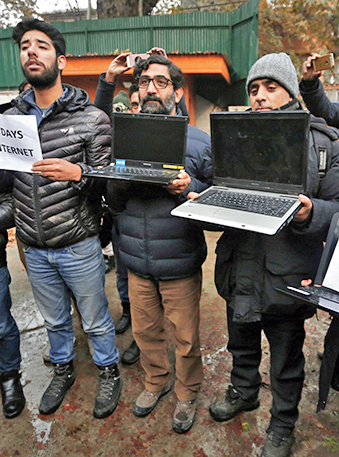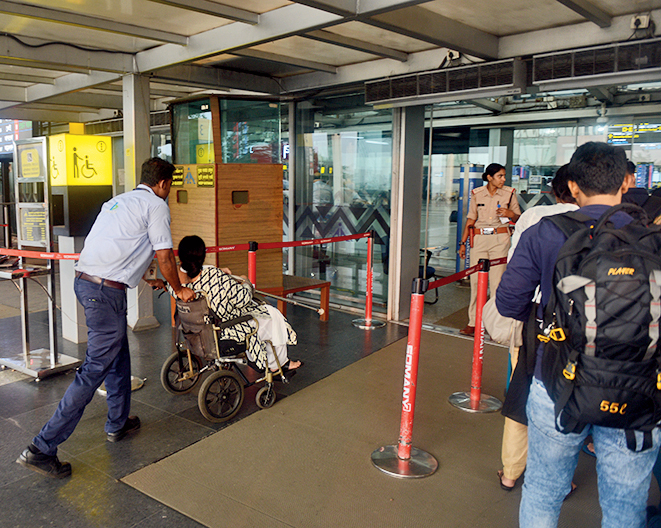Sir — The basic rights of the people of Kashmir have been continually violated for over five months now. This is unheard of in democratic countries. Along with curbs on free movement, this has resulted in a severe gagging of the press, for reporters in the Valley are unable to file their stories. The cavalier promulgation of Section 144 of the Criminal Procedure Code
is a travesty of the idea of freedom, as is its extension for months on end. Only a government that is ill-equipped to manage even the smallest of socio-political problems in the country would be bent on fettering its own people this way. This has damaging implications not only for the economy but for our social fabric as well.
The Supreme Court has now asked the Centre to review all the restrictions and remove the ones that are unjustified. However, one cannot help wondering why such an intervention did not happen earlier. Citizens across the country should also ponder why they did not express their discontent over the human rights violation in Kashmir as robustly as they did recently when a group of vandals attack the hostels of Jawaharlal Nehru University.
R. Narayanan,
Navi Mumbai
Make it right
Sir — Last Friday, the Supreme Court directed the Centre to review all restrictions in place in Kashmir within a week (“Rights in place”, Jan 14). The top court’s order had reasserted the fact that access to the internet is a fundamental right and an indefinite shutdown of the facility is unconstitutional. This may have come as a shock to the Bharatiya Janata Party, but it is a great relief for the people of Kashmir as well as for all the peace-loving citizens of India. Indeed, internet services in Kashmir should be restored immediately.
The apex court’s observations that the repeated imposition of Section 144 in Kashmir would amount to “abuse of power” and that the right to life should be secured in the best possible manner come at a time when the entire nation is witnessing widespread agitations against the Citizenship (Amendment) Act and the implementation of the National Register of Citizens by people hailing from all walks of life. The judgment, authored by the judge, N.V. Ramana, quoted the opening sentence of Charles Dickens’s novel, A Tale of Two Cities — “It was the best of times, it was the worst of times...” — at the beginning. This seems to aptly describe the present circumstances in India, where in spite of many obstacles, ordinary citizens are speaking up.
However, while the court’s ruling is heartening, one wishes that it had not taken five long months — since August 2019, when Article 370 was abrogated, Opposition leaders have been put in jail, the movement of civilians restricted and normal life brought to a grinding halt — for such a judgment to be passed.
The apex court must have been aware of the situation in the Kashmir Valley. If only it had taken up the matter as a suo motu case, the common man might have been spared a lot of undue misery.
The Centre should adhere to the seven-day deadline set by the apex court. It must present the details for the continued restrictions and restore normalcy in the Valley immediately.
Tharcius S. Fernando,
Chennai
Sir — A recent report has revealed that India has lost over $1.3 billion because of internet shutdowns in 2019. This puts the country at the third spot, after Iraq and Sudan, among nations that were economically affected because of frequent internet blackouts. This is not surprising, given that internet services have not been available in Kashmir alone for the last five months. The Centre has already ruined India’s economy by its erratic actions ever since the BJP came to power. It must now salvage whatever remains.
Asit Kumar Mitra,
Calcutta
Sir — It is heartening that the Netaji Subhas Chandra Bose International Airport in Calcutta has received a global certification for its efforts to reduce its carbon footprint. The authorities have taken several steps like switching to more power-efficient electrical drives, implementing sensor-based controls in buildings, setting up solar power plants and reducing water wastage. Besides addressing environmental concerns, the airport has also modified its infrastructure to make it more accessible to the differently abled. This is a step in the right direction. Airports across the country should follow this model.
Abhijit Goswami,
Calcutta

Last Friday, the Supreme Court directed the Centre to review all restrictions in place in Kashmir within a week. The Telegraph











